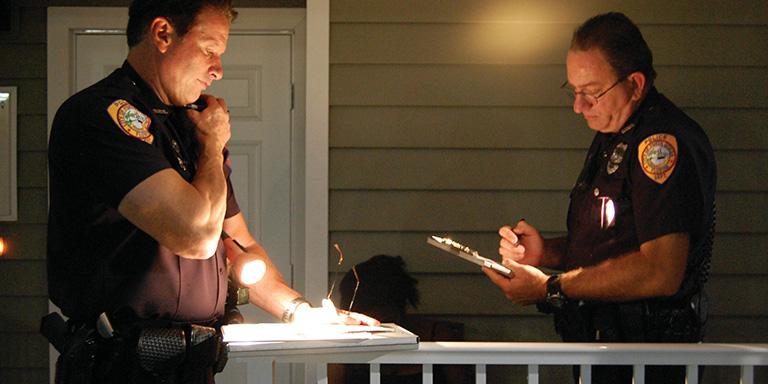Table of Contents
- Immediate Actions to Take When Law Enforcement Arrives on Scene
- Understanding Your Legal Rights and Responsibilities Post-Incident
- Best Practices for Documenting and Reporting Crucial Information
- How Prompt Compliance Can Influence Legal Outcomes and Investigations
- The Conclusion
Immediate Actions to Take When Law Enforcement Arrives on Scene
Upon the arrival of law enforcement at the scene, it is crucial to remain calm and comply fully with all instructions. This includes providing your identification when requested, answering questions truthfully without volunteering extra information, and avoiding any sudden movements that could be misinterpreted. Keeping communication clear and respectful helps officers perform their duties swiftly and reduces the risk of misunderstandings.
Key steps to follow include:
- Stay in one place unless directed otherwise by officers
- Keep your hands visible at all times
- Avoid touching your face or reaching into pockets without permission
- Listen carefully and respond succinctly to questions
- Document details discreetly if possible, such as names and badge numbers
Understanding Your Legal Rights and Responsibilities Post-Incident
Immediately following any incident, it is essential to recognize the legal framework that governs your actions and obligations. Knowing your rights ensures you can protect yourself from inadvertently compromising your position or legal standing. This includes understanding your right to remain silent, your entitlement to legal representation, and the necessity of cooperating with law enforcement without admitting fault. Being informed about these aspects empowers you to respond appropriately while safeguarding your interests.
Equally important are the responsibilities that come with such situations. These include, but are not limited to:
- Providing accurate personal and incident-related information when requested
- Complying with lawful instructions issued by officers or legal authorities
- Preserving evidence and refraining from altering the scene
- Following up with legal counsel and official procedures promptly
Understanding and balancing these rights and responsibilities is critical to ensuring a smooth, legally sound process as the situation progresses. Your adherence to legal guidance immediately after an event can significantly influence the resolution and protect your legal interests going forward.
Best Practices for Documenting and Reporting Crucial Information
After any incident, it is crucial to capture and preserve immediate details while memories and evidence are fresh. Begin by recording precise observations without personal bias-note times, locations, people involved, and any relevant environmental conditions. Utilize multiple formats to ensure accuracy, such as written notes, photographs, or voice recordings. These primary records can prove vital for investigations and legal proceedings, helping to establish a clear and objective narrative of events.
Equally important is the prompt communication of this documented information to authorities or legal representatives. Do not delay contacting the police or designated legal experts, as early reporting increases the likelihood of preserving key evidence and gaining professional guidance. Follow their instructions carefully, and provide all requested documentation in the suggested format to maintain a transparent and trustworthy process. Remember, a methodical and prompt approach strengthens both investigative efficiency and your legal position.
- Write detailed and factual incident reports immediately.
- Secure photographic and digital evidence without alteration.
- Contact law enforcement or legal counsel promptly.
- Follow official instructions precisely to avoid compromising cases.
How Prompt Compliance Can Influence Legal Outcomes and Investigations
Immediate adherence to directives from law enforcement or legal officials after an incident is often pivotal in shaping the trajectory of investigations and judicial proceedings. When individuals comply without delay, it not only expedites evidence gathering but also demonstrates a cooperative stance that can positively impact credibility during testimony or hearings. This prompt compliance minimizes the risk of misunderstandings or inadvertent obstructions that might prolong investigations or complicate legal defenses.
Key benefits of responding swiftly to official guidance include:
- Preservation of critical evidence through timely interviews and documentation.
- Enhancement of investigative efficiency, allowing authorities to allocate resources effectively.
- Reduction of legal liabilities by maintaining transparency and cooperation throughout the process.
- Improvement in overall case outcomes by fostering a positive impression with judicial entities.
The Conclusion
In conclusion, adhering promptly to police or legal guidance following an incident is essential for safeguarding your rights and ensuring a clear and accurate account of events. Timely cooperation with authorities not only facilitates a smoother investigative process but also helps prevent misunderstandings or complications that could arise later. Whether involved as a witness, victim, or suspect, immediate compliance with official instructions provides the best foundation for a fair and just resolution. Staying informed and responsive is key in navigating the aftermath of any incident effectively.Check Our Other Blogs
- StunGun – Your Trusted Source for Stun Guns, Laws, and Self-Defense Tips
- PepperSprayLaws – Your Trusted Resource for Pepper Spray Information
- StunGunLaws – Your Trusted Guide to Stun Gun Legality and Safety




